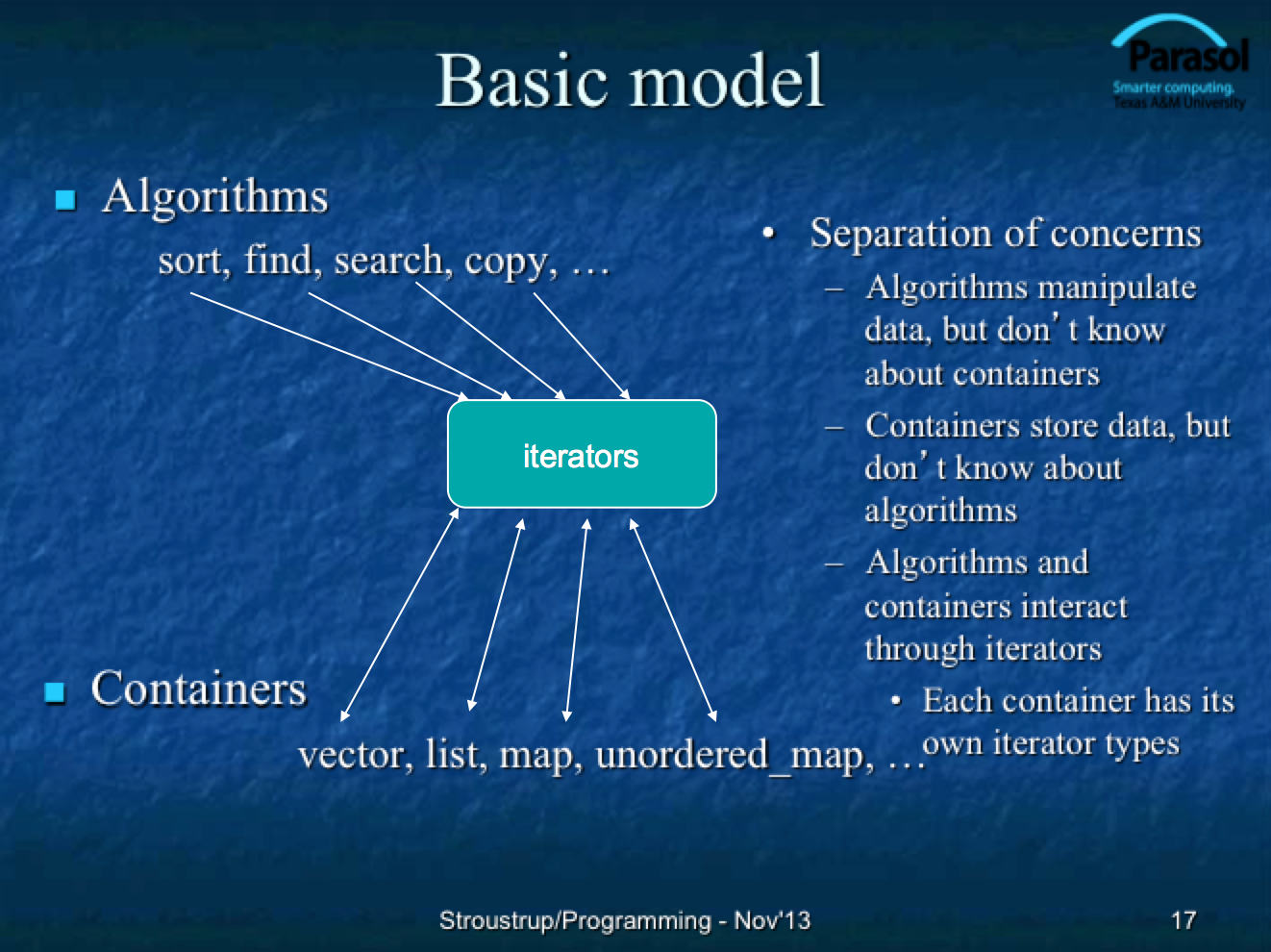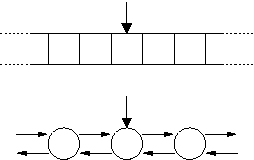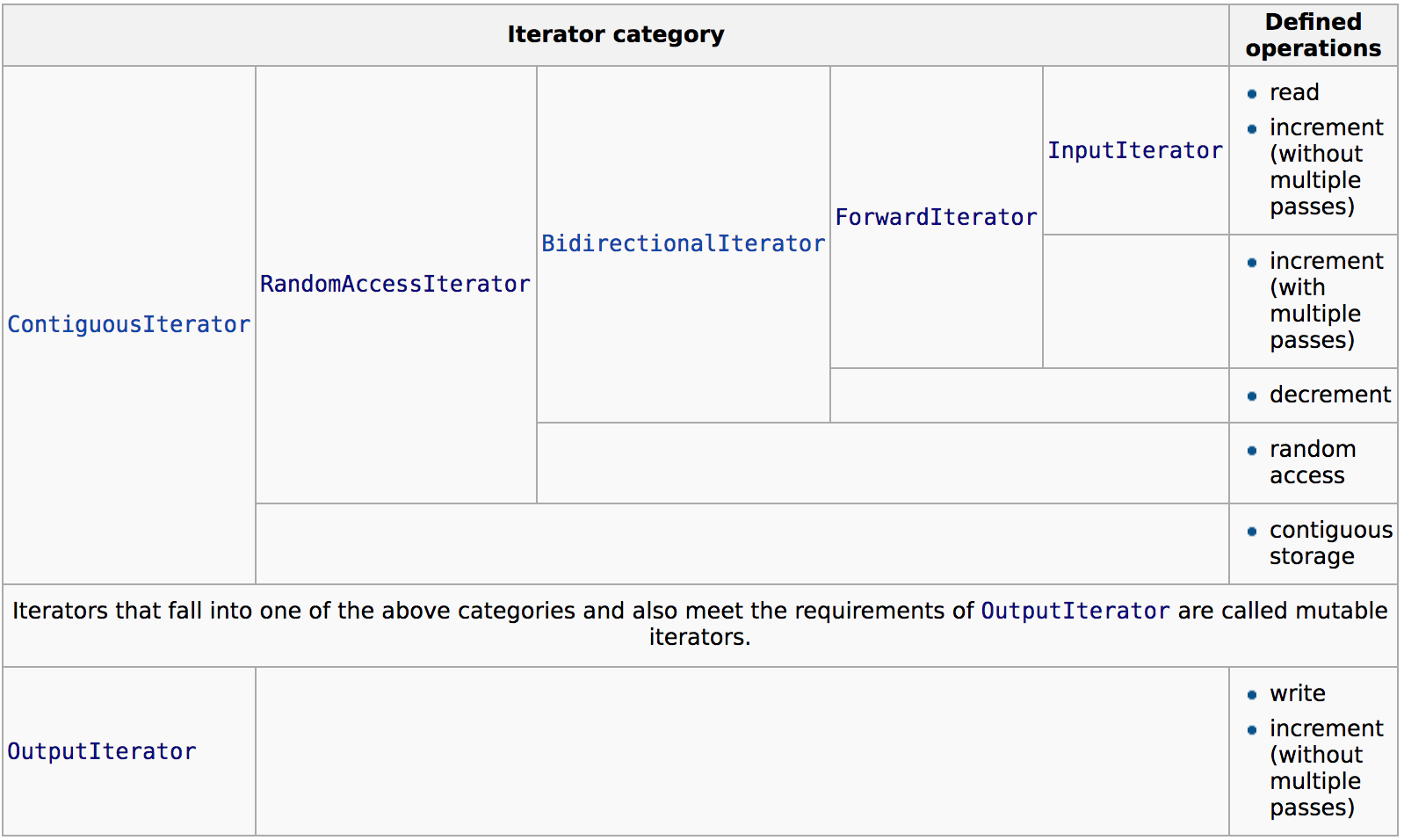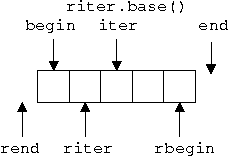最近整理文档,发现之前多看一个同事的分享,讲stl iterator的,讲的挺好,看了一遍后感觉现在用的确实少了。
因此有了这篇笔记,总结下stl里的迭代器。
1. Why Iterator
我们知道stl里有很多算法,例如find,sort,两者定义时模板名字不同
template< class InputIt, class T >
InputIt find( InputIt first, InputIt last, const T& value );
template< class RandomIt >
void sort( RandomIt first, RandomIt last );
虽然InputIt RandomIt只是一个模板名字,不过为什么不同?
甚至有的函数,例如copy模板名字里有两种类型InputIt OutputIt
template< class InputIt, class OutputIt >
OutputIt copy( InputIt first, InputIt last, OutputIt d_first );
再看个例子:代码实现了接收用户输入的数字并输出到屏幕,遇到非数字则退出
std::copy(
std::istream_iterator<int>(std::cin),
std::istream_iterator<int>(),
std::ostream_iterator<int>(std::cout, "\n"));
本文试图系统性的讲清楚这些之后的原理。
2. What Iterator
通常很多人对于stl的理解是两部分:
- container,例如vector list set map…
- algorithm,例如copy find sort…
而iterator则是作为两者之间的粘合剂

注:图片摘抄自C++之父Bjarne Stroustrup的Lecture slides ch20
我们知道stl里container和其元素类型无关,这是通过模板技术做到的。
而通过iterator,则做到了algorithm和container无关,甚至我们可以把自定义iterator类型传入stl里的algorithm。
例如stl里的find,copy参数都是iterator类型,而不是const Container& c。
确切的说,iterator是一种广义的指针
Iterator is a generalized pointer identifying a position in a container.

同时像指针一样,支持operator++ operator*
Allows moving in the container (operator++) and accessing elements (operator*)
3. Iterator Category
上面提到的operator++ operator*是一个iterator最基本的功能,我们考虑find的实现
template<class InputIt, class T>
InputIt find(InputIt first, InputIt last, const T& value)
{
for (; first != last; ++first) {
if (*first == value) {
return first;
}
}
return last;
}
可以看到find函数需要的iterator,还用到了operator !=。而根据iterator实现的接口不同,分为了5类.

注:ContiguousIterator在C++17引入,本文不做介绍
可以看到所有的类型(除了OutputIterator)都继承自InputIterator,如果同时满足OutputIterator,那么就称为mutable的,否则称为const_iterator。
有些文档里会认为ForwardIterator继承自InputIterator && OutputIterator,

区别不大,相当于默认认为是可写的。
接下来,我们分别介绍下这五种iterator.
3.1. InputIterator
InputIterator里的input指的是from container to the program,即相对于program而言是input。
stl-algorithm里的find参数、copy里的源数据参数,都定义为InputIterator。
举个istream_iterator的例子:
//构造std::cin对应的iterator
std::istream_iterator<int> iter(std::cin);
//读入iter的数据同时存储到value1 value2
int value1 = *iter;
int value2 = *iter;
//输出value1 value2
std::cout << value1 << std::endl;
std::cout << value2 << std::endl;
注意没有调用iter++时,我们只能输入一个数字,value1=value2.
3.2. OutputIterator
OutputIterator的output,对应的,指的是from program to the container。
stl-algorithm里的copy里的目标参数类型,即为OutputIterator.
对应上面的例子,可以修改为
std::istream_iterator<int> iter(std::cin);
int value1 = *iter++;
int value2 = *iter;
std::ostream_iterator<int> iter_out(std::cout, "\n");
//输出两个value
*iter_out = value1;
*iter_out = value2;
当然,使用std::copy,我们可以写出更加简洁的代码
std::copy(
std::istream_iterator<int>(std::cin),
std::istream_iterator<int>(),
std::ostream_iterator<int>(std::cout, "\n"));
3.3. ForwardIterator
ForwardIterator增加了mulit-pass。
这里我们先引入一个one-pass multi-pass的概念,其中InputIterator/OutputIterator都是one-pass的,即任何情况下都只有一个active的iterator,我们看个istream_iterator的例子:
// 定义istream_iterator,输入1
auto iter1 = std::istream_iterator<int>(std::cin);
auto iter2 = iter1;
// *iter1:1
std::cout << "*iter1:" << *iter1 << std::endl;
// *iter2:1
std::cout << "*iter2:" << *iter2 << std::endl;
// increment iter1,输入2
++iter1;
// increment iter2,输入3
++iter2;
// *iter1:2
std::cout << "*iter1:" << *iter1 << std::endl;
// *iter2:3
std::cout << "*iter2:" << *iter2 << std::endl;
可以看到虽然iter1 iter2初始相等,但是分别++后指向了不同的value。
也就是说,对于std::cin,只能有一个iterator允许自增操作,这个iterator称为active的。或者是iter1,或者是iter2,指向新输入的value,而不能有两个active的iterator,都自增,然后指向同一个value。即
input iterator x == y does not imply ++x == ++y. forward iterator x == y implies ++x == ++y.
更多区别可以参考iterator。
stl-algorithm里的replace,fill, adjacent_find参数都需要的是ForwardIterator
template< class ForwardIt, class T >
void replace( ForwardIt first, ForwardIt last,
const T& old_value, const T& new_value );
template< class ForwardIt, class T >
void fill( ForwardIt first, ForwardIt last, const T& value );
template< class ForwardIt >
ForwardIt adjacent_find( ForwardIt first, ForwardIt last );
考虑下adjacent_find的实现
template<class ForwardIt>
ForwardIt adjacent_find(ForwardIt first, ForwardIt last)
{
if (first == last) {
return last;
}
ForwardIt next = first;
++next;
for (; next != last; ++next, ++first) {
if (*first == *next) {
return first;
}
}
return last;
}
注意++next, ++first这句,因此算法需要iterator支持multi-pass operator++
我们看一个forward_list的例子
std::forward_list<int> flist{1, 2, 5, 4, 3};
auto iter = flist.begin();
//2
std::cout << *++iter << std::endl;
// compile error: no match for 'operator--' (operand type is 'std::_Fwd_list_iterator<int>')
//std::cout << *--iter << std::endl;
// compile error: no match for 'operator+' (operand types are 'std::_Fwd_list_iterator<int>' and 'int' )
// std::cout << *(iter + 1)<< std::endl;
*++iter可以正确获取对应的元素。
*--iter *(iter + 1)则会导致compile error,因为std::forward_list::iterator没有实现operator-- operator+
3.4. BidirectionalIterator
BidrectionalIterator增加了operator--
stl-algorithm里的reverse,inplace_merge都需要传入BidirectionalIterator。
template< class BidirIt >
void reverse( BidirIt first, BidirIt last );
template< class BidirIt >
void inplace_merge( BidirIt first, BidirIt middle, BidirIt last );
考虑reverse的pseudocode
template<class BidirIt>
void reverse(BidirIt first, BidirIt last)
{
while ((first != last) && (first != --last)) {
std::iter_swap(first++, last);
}
}
可以看到--last用到了operator--,也就是算法需要的iterator需要支持opertor--
我们把ForwardIterator例子里的forward_list换成list
std::list<int> list{1, 2, 5, 4, 3};
auto iter = list.begin();
//2
std::cout << *++iter << std::endl;
//1
std::cout << *--iter << std::endl;
// compile error: no match for 'operator+' (operand types are 'std::_List_iterator<int>' and 'int')
// std::cout << *(iter + 1)<< std::endl;
*++iter *--iter可以正确获取对应的元素,*(iter + 1)仍然会导致编译错误(提示略有不同)。
3.5. RandomAccessIterator
RandomAccessIterator增加了随机访问的功能
stl-algorithm里的sort需要传入RandomAccessIterator。
template< class RandomIt >
void sort( RandomIt first, RandomIt last );
因为sort实现时用到了快排、堆排序和插入排序,需要用到iterator的operator- operator+(例如快排分为两部分时枢纽位置的pivot-1 pivot+1)。
vector/deque的iterator满足这个需求,我们继续更新BidirectionalIterator的例子,list换成vector
std::vector<int> vec{1, 2, 5, 4, 3};
auto iter = vec.begin();
//2
std::cout << *++iter << std::endl;
//1
std::cout << *--iter << std::endl;
//2
std::cout << *(iter + 1)<< std::endl;
可以看到opertor++ -- - +都可以正确获取对应的元素。
3. Required vs Provided
stl-algorithm里的算法有分别需要的最低级别的iteator,例如find需要InputIterator,而sort需要的是RandomIterator,我们称为iterator required。
而对于stl-containers,则提供了对应的iterator,称为iterator provided。
前面我们也有介绍到,总结下:
| Iterator Category | Ability | Providers |
|---|---|---|
| Output iterator | Writes forward | Ostream, inserter |
| Input iterator | Reads forward once | Istream |
| Forward iterator | Reads forward | Forward list, unordered containers |
| Bidirectional iterator | Reads forward and backward | List, set, multiset, map, multimap |
| Random-access iterator | Reads with random access | Array, vector, deque, string, C-style array |
注:上表摘抄自The C++ Standard Library Second Edition
可以看到C-style array属于RandomAccessIteratory,属于最高级别的iteator,因此能够用于stl-algorithm.
4. Iterator Helper Function
stl里提供了一些函数用于处理iterator。
前面介绍了不同iterator接口不同,比如我们有个需求,对当前iterator指向往后+5个位置
如果是RandomAccessIteator,我们可以直接操作
iter += 5;
但是对于Non RandomAccessIterator,我们需要一个for-loop
for (int i = 0; i < 5; ++i)
iter++;
stl提供了一些help function,封装了这些对于不同类型迭代器的实现,使用起来更加优雅一些。
4.1. advance
template< class InputIt, class Distance >
void advance( InputIt& it, Distance n );
advance修改输入的it,n可以取正负数。
注意需要调用方自己保证:
- iterator在合理range内,例如[c.begin, c.end)
- 如果n为负数,需要iterator支持backward
否则行为是不确定的
std::forward_list<int> c{1, 2, 3, 4, 5};
auto iter = c.begin();
//1
std::cout << *iter << std::endl;
std::advance(iter, 2);
//3
std::cout << *iter << std::endl;
// std::advance(iter, 1);
// std::advance(iter, -1);
注意最后两行,在我的测试环境下会导致程序core掉,在有些编译器上会无法编译。
cppreference上说明了undefined behavior的情况:
If n is negative, the iterator is decremented. In this case, InputIt must meet the requirements of BidirectionalIterator, otherwise the behavior is undefined.
The behavior is undefined if the specified sequence of increments or decrements would require that a non-incrementable iterator (such as the past-the-end iterator) is incremented, or that a non-decrementable iterator (such as the front iterator or the singular iterator) is decremented.
类似的还有类似于我们要构造一个 string 的倒置:
std::string A = "abc";
std::string B;
// std::reverse_copy(A.begin(), A.end(), B.begin());//undefined behavior
std::reverse_copy(A.begin(), A.end(), std::back_inserter(B));//right
时间复杂度上是O(n),如果是RandomAccessIterator,则是O(1)。
advance经常用来跳过std::cin的输入,例如这样忽略前两个输入的int值:
std::istream_iterator<int> iter(std::cin);
advance(iter, 2);
4.2. next/prev
next/prev在c++11引入,与advance最大的不同是不修改输入参数,而是通过返回值的形式。
template< class ForwardIt >
ForwardIt next(
ForwardIt it,
typename std::iterator_traits<ForwardIt>::difference_type n = 1 );
template< class BidirIt >
BidirIt prev(
BidirIt it,
typename std::iterator_traits<BidirIt>::difference_type n = 1 );
关于性能上,The C++ Standard Library Second Edition在next里提到了
Calls advance(pos,n) for an internal temporary object.
没有理解,我理解的是next会引入额外的临时变量,了解的朋友欢迎交流下。(感觉抠性能抠到这个份上一定是个大神了🙂)
从官方文档理解,应该是推荐用next/prev。
4.3. distance
distance用于计算两个iterator的距离
template< class InputIt >
typename std::iterator_traits<InputIt>::difference_type
distance( InputIt first, InputIt last );
4.4. iter_swap
template< class ForwardIt1, class ForwardIt2 >
void iter_swap( ForwardIt1 a, ForwardIt2 b );
注意从声明上可以看到iter_swap的两个参数不需要相同类型,只要对应的value能够互相转化即可
std::vector<int> v{1, 2, 3, 4, 5};
std::list<int> l{6, 7, 8, 9, 10};
std::iter_swap(v.begin(), next(v.begin()));
std::iter_swap(v.begin(), l.begin());
//6
//1
//3
//4
//5
std::copy(
v.begin(),
v.end(),
std::ostream_iterator<int>(std::cout, "\n"));
//2
//7
//8
//9
//10
std::copy(
l.begin(),
l.end(),
std::ostream_iterator<int>(std::cout, "\n"));
5. Iterator Adaptors
Input/Output/Forward/Bidirectional/RandomAccess这些都只是定义了iterator的类别。
第三节里我们介绍了stl-containers里provide的iterator分别满足哪种类别。
为了方便stl-algorithms里的各个算法,stl还预定义了一些具体化的iterator,它们定义了具体行为,对算法起到了极大的辅助作用。
5.1. Reverse Iterator
Reverse Iterator提供了反方向遍历的能力,与iterator的位置对应如图

可以看到对于iterator:
- begin指向第一个元素
- end指向最后一个元素下一个位置,也就是past the end
对于reverse iterator则正好相反:
- rbegin指向最后一个元素
- rend指向第一个元素上一个位置
iterator与reverse_iterator可以互相转换,其中iter指向对应的reverse_iterator下一个位置。
看个例子
std::vector<int> v{1, 2, 3, 4, 5};
//iter指向第4个元素,即value = 4
std::vector<int>::iterator iter = v.begin() + 3;
//riter由iter得到,指向iter前一个元素
std::vector<int>::reverse_iterator riter(iter);
//也可以直接用std::reverse_iterator定义
// std::reverse_iterator<std::vector<int>::iterator> riter(iter);
std::cout << *iter << std::endl;//4
//iter +1向后一个位置
std::cout << *(iter + 1) << std::endl;//5
std::cout << *riter << std::endl;//3
//riter +1向前一个位置
std::cout << *(riter + 1) << std::endl;//2
//使用base获取iter位置,两者相同
std::cout << *iter.base() << std::endl;//4
std::cout << *riter.base() << std::endl;//4
5.2. Insert Iterator
Insert Iterator分为三种
- Back Insert
- Front Insert
- General Insert
例如我们希望将输入数据存储到vector
std::vector<int> v;
std::copy(
std::istream_iterator<int>(std::cin),
std::istream_iterator<int>(),
v.begin());
这么写会导致undefined behavior,因为v并没有足够的空间存储输入数据,reverse保证空间是一个办法。更优雅的办法是使用insert
std::vector<int> v;
std::copy(
std::istream_iterator<int>(std::cin),
std::istream_iterator<int>(),
// std::back_inserter(v));
std::inserter(v, v.end()));
注意使用std::inserter std::back_inserter都是可以的,不过使用front_inserter则会导致编译错误
std::vector<int> v;
std::copy(
std::istream_iterator<int>(std::cin),
std::istream_iterator<int>(),
//error: ‘class std::vector<int>’ has no member named ‘push_front’
std::front_inserter(v));
因为std::front_inserter实现上调用的是push_front,而std::vector并没有这个接口。
各种inserter对应的function列表如下:
| Name | Class | Called Function | Creation |
|---|---|---|---|
| Back inserter | back_insert_iterator | push_back(value) | back_inserter(cont) |
| Front inserter | front_insert_iterator | push_front(value) | front_inserter(cont) |
| General inserter | insert_iterator | insert(pos,value) | inserter(cont,pos) |
5.3. Stream Iterator
Stream Iterator包含两种
- istream_iterator
- ostream_iterator
前面出现过很多次,不多做介绍了
6.Iterator Traits
Traits的思想在stl里几乎处处都是,我们再回顾下。
6.1. Traits
例如我们实现iter_swap这个函数,需要使用value_type指定数据类型
template <class Iterator>
void iter_swap (Iterator a, Iterator b) {
// define value_type
value_type tmp = *a;
*a = *b;
*b = tmp;
}
一个想法是为每种iterator都定义一个value_type。(或许用C++11里的decltype也可以?)
struct my_iterator {
typedef ... value_type;
...
};
然而这个想法对指针却不适用,因为指针不是一个struct。
stl里的解决方法就是定义一个辅助模板类
template <class Iterator>
struct iterator_traits {
typedef typename iterator::value_type value_type;
};
对指针则偏特化
template <class T>
struct iterator_traits<T*> {
typedef T value_type;
};
这样我们就可以在iter_swap里这么使用
typedef typename iterator_traits<Iterator>::value_type value_type;
value_type ...;
std::iterator_traits定义了更多类型(这也是decltype不是万金油的原因)
template < class Iterator > struct iterator_traits {
typedef typename Iterator::value_type value_type ;
typedef typename Iterator::difference_type difference_type ;
typedef typename Iterator::pointer pointer ;
typedef typename Iterator::reference reference ;
typedef typename Iterator::iterator_category iterator_category ;
};
//指针类型的特化
template < class T > struct iterator_traits <T* > {
typedef T value_type ;
typedef ptrdiff_t difference_type ;
typedef T* pointer ;
typedef T& reference ;
typedef random_access_iterator_tag iterator_category ;
};
template < class T > struct iterator_traits <const T* > {
typedef T value_type ;
typedef ptrdiff_t difference_type ;
typedef const T* pointer ;
typedef const T& reference ;
typedef random_access_iterator_tag iterator_category ;
};
整理成表格即:
| Member type | Definition |
|---|---|
| difference_type | Iterator::difference_type |
| value_type | Iterator::value_type |
| pointer | Iterator::pointer |
| reference | Iterator::reference |
| iterator_category | Iterator::iterator_category |
对指针类型也有对应的特化
| Member | type Definition |
|---|---|
| difference_type | std::ptrdiff_t |
| value_type | T (until C++20)std::remove_cv_t |
| pointer | T* |
| reference | T& |
| iterator_category | std::random_access_iterator_tag |
具体可以参考http://en.cppreference.com/w/cpp/iterator/iterator_traits
6.2. Tag Dispatching
再考虑advance的实现
template< class InputIt, class Distance >
void advance( InputIt& it, Distance n );
我们知道advance的时间复杂度跟iterator类型有关(是否支持+=)
Linear.
However, if InputIt additionally meets the requirements of RandomAccessIterator, complexity is constant.
即对于RandomAccessIterator,实现可能是这样子的
template <class RandomAccessIterator, class Distance>
void advance (RandomAccessIterator& i, Distance n) {
i += n;
}
stl的解决方法是定义tag
struct input_iterator_tag { };
struct output_iterator_tag { };
struct forward_iterator_tag : public input_iterator_tag { };
struct bidirectional_iterator_tag : public forward_iterator_tag { };
struct random_access_iterator_tag : public bidirectional_iterator_tag { };
5种tag分别对应5种类型的iterator。
std::iterator是一个模板类,通过传入不同的iterator_category标记不同的iterator类型,具体可以参考iterator_traits,原理即
foo(Iterator Iter)
->
foo(Iterator Iter, typename std::iterator_traits<Iter>::iterator_category())
->
foo(Iterator Iter, std::input_iterator_tag)
...
foo(Iterator Iter, std::random_access_iterator_tag)
当然,借助std::enable_if我们可以有另一种实现方案(原理相同)
template<class BDIter,
typename std::enable_if<
std::is_base_of<std::bidirectional_iterator_tag,
typename std::iterator_traits<BDIter>::iterator_category >::value &&
!std::is_same<std::random_access_iterator_tag,
typename std::iterator_traits<BDIter>::iterator_category >::value
>::type* = nullptr
>
void alg(BDIter, BDIter)
{
std::cout << "alg() called for bidirectional iterator\n";
}
template<class BDIter,
typename std::enable_if<
std::is_base_of<std::random_access_iterator_tag,
typename std::iterator_traits<BDIter>::iterator_category >::value
>::type* = nullptr
>
void alg(BDIter, BDIter)
{
std::cout << "alg() called for random-access iterator\n";
}
6.3 User-Define Iterator
自定义iterator最好的办法是继承stl里的iterator
template < class Category , class Value , class Distance = ptrdiff_t ,
class Pointer = Value*, class Reference = Value&>
struct iterator {
typedef Category category ;
typedef Value value_type ;
typedef Distance difference_type ;
typedef Pointer pointer ;
typedef Reference reference ;
}
例如我们可以这么定义my_iterator,并应用stl里的find算法。
struct node {
int val;
node* next;
node (int i, node* n) : val(i), next(n) {}
// implicit copy constructor, copy assignment and destructor
// no default constructor
struct my_iterator
: std::forward_list<int>::iterator
// : std::iterator<std::forward_iterator_tag, int>
{
node* ptr;
explicit my_iterator (node* p = 0) : ptr(p) {}
// implicit copy constructor, copy assignment and destructor
reference operator* () { return ptr->val; }
my_iterator& operator++ () { ptr = ptr->next; return *this; }
my_iterator operator++ (int) {
my_iterator tmp = *this; ++*this; return tmp; }
bool operator== (const my_iterator& other) const {
return ptr == other.ptr;
}
bool operator!= (const my_iterator& other) const {
return ptr != other.ptr;
}
};
struct const_iterator
: std::forward_list<int>::const_iterator
// : std::iterator<std::forward_iterator_tag, int, std::ptrdiff_t,
// const int*, const int&>
{
const node* ptr;
explicit const_iterator (const node* p = 0) : ptr(p) {}
// implicit copy constructor, copy assignment and destructor
const_iterator (const my_iterator& i) : ptr(i.ptr) {}
reference operator* () { return ptr->val; }
const_iterator& operator++ () { ptr = ptr->next; return *this; }
const_iterator operator++ (int) {
const_iterator tmp = *this; ++*this; return tmp; }
bool operator== (const const_iterator& other) const {
return ptr == other.ptr;
}
bool operator!= (const const_iterator& other) const {
return ptr != other.ptr;
}
};
friend
bool operator== (my_iterator a, const_iterator b) {
return a.ptr == b.ptr;
}
friend
bool operator!= (my_iterator a, const_iterator b) {
return a.ptr != b.ptr;
}
friend
bool operator== (const_iterator a, my_iterator b) {
return a.ptr == b.ptr;
}
friend
bool operator!= (const_iterator a, my_iterator b) {
return a.ptr != b.ptr;
}
my_iterator begin() { return my_iterator(this); }
my_iterator end() { return my_iterator(); }
const_iterator begin() const { return const_iterator(this); }
const_iterator end() const { return const_iterator(); }
};
int main() {
node* list = new node(3,0);
list = new node(2, list);
list = new node(1, list);
node::my_iterator iter = std::find(list->begin(), list->end(), 2);
assert (*iter==2);
return 0;
}
7. Conclusion
stl-iterator实际上是一个很庞大的话题,细细展开已经不是一篇文章两万字可以讲清楚的了,例如iterator的设计思想,tag dispatcher,traits的设计,包括half-open的range:[begin, end)已经成为我们对于range一个标准的理解。而stl还在不断的完善这个feature,例如Move Iterators的设计。伴随stl-algorithm function,iterator可以呈现更大的空间,之后会写一篇文章总结下stl里的algorithm。
当然iterator的使用也有很多需要注意的地方:singular past-the-end out-of-range dangling inconsistent等,如果有时间也想总结一篇。
18年正式到来了,感觉有很多技术点想要分享🐶。
熟练使用iterator,离我们对于代码的追求能更进一步: more effecient, less buggy, more reable, more clean